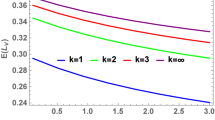Abstract
This paper deals with the stationary and transient analysis of a single server queueing model subject to differentiated working vacation and customer impatience. Customers are assumed to arrive according to a Poisson process and the service times are assumed to be exponentially distributed. When the system empties, the single server takes a vacation of some random duration (Type I) and upon his return if the system is still empty, he takes another vacation of shorter duration (Type II). Both the vacation duration are assumed to follow exponential distribution. Further, the impatient behaviour of the waiting customer due to slow service during the period of vacation is also considered. Explicit expressions for the time dependent system size probabilities are obtained in terms of confluent hyper geometric series and modified Bessel’s function of first kind using Laplace transform, continued fractions and generating function methodologies. Numerical illustrations are added to depict the effect of variations in different parameter values on the time dependent probabilities.
Access this chapter
Tax calculation will be finalised at checkout
Purchases are for personal use only
Similar content being viewed by others
References
Gradshteyn, I., Ryzhik, I., Jeffery, A., Zwillinger, D. (eds.): Table of Integrals, Series and Products, 7th edn. Academic Press, Elsevier (2007)
Ibe, O.C., Isijola, O.A.: M/M/1 multiple vacation queueing systems with differentiated vacation. Model. Simul. Eng. 6, 1–6 (2014)
Seo, J.-B., Lee, S.-Q., Park, N.-H., Lee, H.-W., Cho, C.-H. (eds.): Performance analysis of sleep mode operation in IEEE 802.16e. In: 38th IEEE Vehicular Technology Conference, vol. 2, pp. 1169–1173 (2004)
Lorentzen, L., Waadeland, H.: Continued Fractions with Applications. Studies in Computational Mathematics, vol. 3. Elsevier, Amsterdam (1992)
Chakrabory, S.: Analyzing peer specific power saving in IEEE 802.11s through queueing petri Nnets: some insights and future research directions. IEEE Trans. Wireless Commun. 15, 3746–3754 (2016)
Suranga Sampth, M.I.G., Liu, J.: Impact of customer Impatience on an \( M/M/1 \) queueing system subject to differentiated vacations with a waiting server. Qual. Tech. Quant. Manag. (2018). https://doi.org/10.1080/16843703.2018.1555877
Phung-Duc, T.: Single-server systems with power-saving modes. In: Gribaudo, M., Manini, D., Remke, A. (eds.) ASMTA 2015. LNCS, vol. 9081, pp. 158–172. Springer, Cham (2015). https://doi.org/10.1007/978-3-319-18579-8_12
Vijayashree, K.V., Janani, B.: Transient analysis of an M/M/1 queueing system subject to differentiated vacations. Qual. Tech. Quant. Manage. 15, 730–748 (2018)
Xiao, Y.: Energy saving mechanism in the IEEE 80216e wireless MAN. IEEE Commun. Lett. 9, 595–597 (2005)
Niu, Z., Zhu, Y., Benetis, V.: A phase-type based markov chain model for IEEE 802.16e sleep mode and its performance analysis. In: Proceeding of the 20th International Teletraffic Congress, Canada, pp. 17–21 (2001)
Author information
Authors and Affiliations
Corresponding author
Editor information
Editors and Affiliations
Appendix: Derivation of \( \phi_{n} \left( t \right) \,{\text{and}} \,\psi_{n} \left( t \right) \)
Appendix: Derivation of \( \phi_{n} \left( t \right) \,{\text{and}} \,\psi_{n} \left( t \right) \)
The confluent hypergeometric function represented by \( {}_{1}{\text{F}}_{1} \left( {{\rm{a}};{\text{c}};{\rm{z}}} \right) \) has a series representation given by
Consider the repression for \( \hat{\phi }_{n} \left( s \right) \) obtained as
Using the definition of confluent hypergeometric function, we obtain
And hence
Applying partial fraction in the above equation, we get
Now, consider the term in the denominator of \( \hat{\phi }_{n} \left( s \right) \) as
Where \( \hat{a}_{k} \left( s \right) = \frac{{\mathop \prod \nolimits_{j = 1}^{k} \left( {\mu_{1} + j\xi } \right)}}{{\mathop \prod \nolimits_{i = 1}^{k} \left( {s + \gamma_{1} + \mu_{1} + i\xi } \right)}}\left( {\frac{1}{{\xi^{k} k!}}} \right)\, {\text{and}} \,\hat{a}_{0} \left( s \right) = 1. \) By resolving into partial fractions, we have
Using the identity is given by Gradshteyn et al. (2007), it is seen that
where \( \hat{b}_{0} \left( s \right) = 1 \,{\text{and }}\,{\rm{for}}\, k = 1,2,3 \ldots \)
Substituting Eq. (A.3) and Eq. (A.2) in Eq. (A.1), we get
Taking inverse Laplace transform of the above equation leads to
where
and
Similarly equation of \( \hat{\psi }_{n} \left( s \right) \) as
Proceeding in the similar manner as that of \( \hat{\phi }_{n} \left( s \right) \), it is seen that the Laplace inverse of \( \hat{\psi }_{n} \left( s \right) \) is
where
and
Rights and permissions
Copyright information
© 2020 Springer Nature Singapore Pte Ltd.
About this paper
Cite this paper
Vijayashree, K.V., Ambika, K. (2020). An M/M/1 Queueing Model Subject to Differentiated Working Vacation and Customer Impatience. In: Balusamy, S., Dudin, A.N., Graña, M., Mohideen, A.K., Sreelaja, N.K., Malar, B. (eds) Computational Intelligence, Cyber Security and Computational Models. Models and Techniques for Intelligent Systems and Automation. ICC3 2019. Communications in Computer and Information Science, vol 1213. Springer, Singapore. https://doi.org/10.1007/978-981-15-9700-8_9
Download citation
DOI: https://doi.org/10.1007/978-981-15-9700-8_9
Published:
Publisher Name: Springer, Singapore
Print ISBN: 978-981-15-9699-5
Online ISBN: 978-981-15-9700-8
eBook Packages: Computer ScienceComputer Science (R0)


